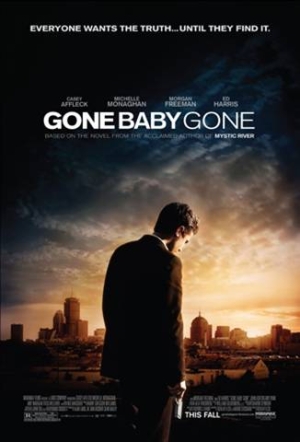 "Boston seems like the most forbidding city in crime movies. There are lots of movies about criminals in Los Angeles, Chicago, New York and points between, but somehow in Boston the wounds cut deeper, the characters are angrier, their resentments bleed, their grudges never die, and they all know everybody else's business. " - Roger Ebert
"Boston seems like the most forbidding city in crime movies. There are lots of movies about criminals in Los Angeles, Chicago, New York and points between, but somehow in Boston the wounds cut deeper, the characters are angrier, their resentments bleed, their grudges never die, and they all know everybody else's business. " - Roger EbertAnyone who has lived their life in Boston, or really in any part of New England, can tell you that Ebert is right. This isn't to say that I could tell you what is at the root of the city's persistently brooding character - as my friends and I enter adulthood, our conversation frequently returns to the complex, perhaps impenetrable code of values and conventions we struggled to understand as children and now wonder if we're destined to inherit. I suspect this is true no matter what part of the globe one calls home; Gone Baby Gone, Ben Affleck's directorial debut, is a film about Boston, but also about this process of disillusionment, of discovering how we are both defined and separate from the place we call home. An expertly made mystery, it's also an uncommonly strong first feature, a work of surprising moral complexity and an evocative portrait of a city.
Adapted from a Dennis Lehane novel, Gone Baby Gone is a stronger representation of Boston than even the previous Lehane adaptation, Mystic River (a very good film that could have been set in any number of cities). Affleck, who famously grew up in Boston, finds an effective tone from the start, with a montage of everyday life in Dorcester becoming a series of portraits of hard-living, world-weary faces. We see this particularly rough part of Southie through the eyes of Patrick Kenzie (Casey Affleck), a young private eye hired to find a missing 4-year-old girl by her aunt and uncle (Amy Madigan and Titus Welliver). Dismissed by older, venerable cops Remy Bressant (Ed Harris) and captain Jack Poole (Morgan Freeman) for his youth and moral idealism, Patrick is also tied to the drug dealers and criminals he has known since childhood. Patrick describes in voiceover the very Catholic struggle to be in the world but not of the world, and Affleck (in one of two great performances of 2007) brings this inner struggle to life as Patrick's investigation forces him to deal with the moral ambiguity that defines his world, even as this conflict strains he is relationship with his girlfriend and partner, Angie (Michelle Monaghan). While Gone Baby Gone works wonderfully as a tense procedural, it is ultimately about the tough choices at its heart; to the elder Affleck's credit, he doesn't attempt a shootout-driven resolution, instead letting the questions his story raises continue long after the stunning final fade-out.
Affleck is also smart in his casting - both Harris and Freeman, as the city's representatives of moral certainty, bring to their roles an authority that can't be faked. Affleck's obvious respect for these giants lends credibility to his protagonist's sense of being outweighed, and gives Patrick's maturation added gravity. An argument between Patrick and Remy about doing the right thing takes on the weight of a Socratic dialogue, largely thanks to Harris' ferocity. For all the big names Affleck landed, however, it's Amy Ryan as the missing girl's mother who steals the film. A mean, dead-eyed druggie, Helene could have easily been a caricature, but Ryan creates a nuanced, insightful portrait of a woman who has survived unknown abuses by hardening herself against the world. We pray for her to redeem herself even as we know how improbable that is; a lesser actor would have played this dynamic for shallow pathos, but Ryan is so believable and compelling that this conflict becomes the film's heart.
Perhaps it took returning to Boston for Affleck to make a film on this level - even Good Will Hunting doesn't begin to suggest this film's maturity. The occasional visual misstep (most likely a result of the first-timer's desire to impress) aside, Affleck creates and sustains a somber, contemplative tone that sets Gone Baby Gone apart from other procedurals. While a story centering around a missing child practically invites a sensationalistic, ripped-from-the-headlines approach, Affleck uses it to explore our idelization of youth and our underlying cynicism - when, late in the film, a character says "I love kids," the line is devastating for everything it implies about what motivates the choices we make everyday. John Toll's hard-edged cinematography and Harry Gregson-Williams' mounful score underline the film's mounting sense of uncertainty. When Affleck does give us one answer, in the perfect final scene, we can only say to ourselves, "Well, what else can you do?" Gone Baby Gone is filled with questions like that, and in its refusal to give us easy answers, it's as hard-headed and indelible as the city itself.
4 comments:
I consider everyone must read this.
Well, I don't actually think this is likely to have effect.
Actually this movie isn't as bad as critics said I give it 7 out of ten.
So, I don't actually suppose this may have success.
Post a Comment